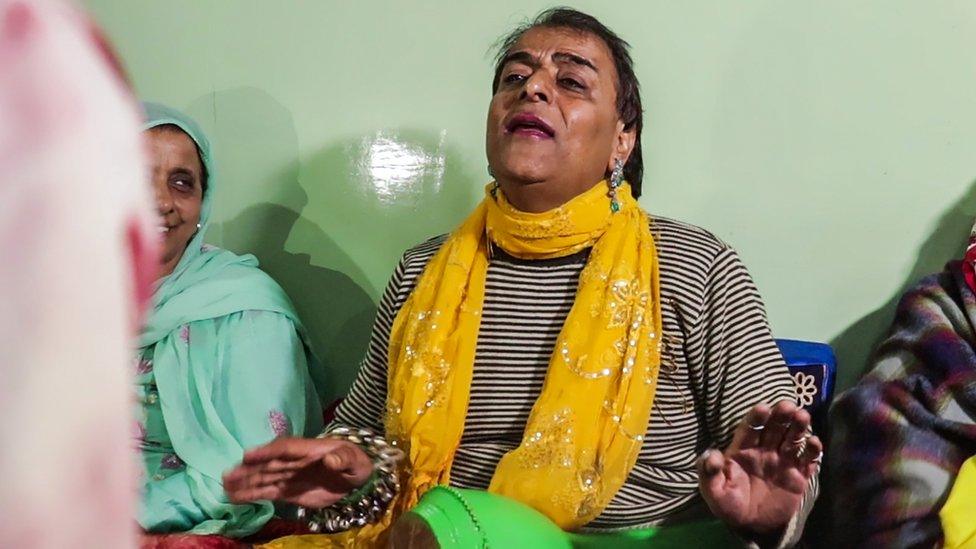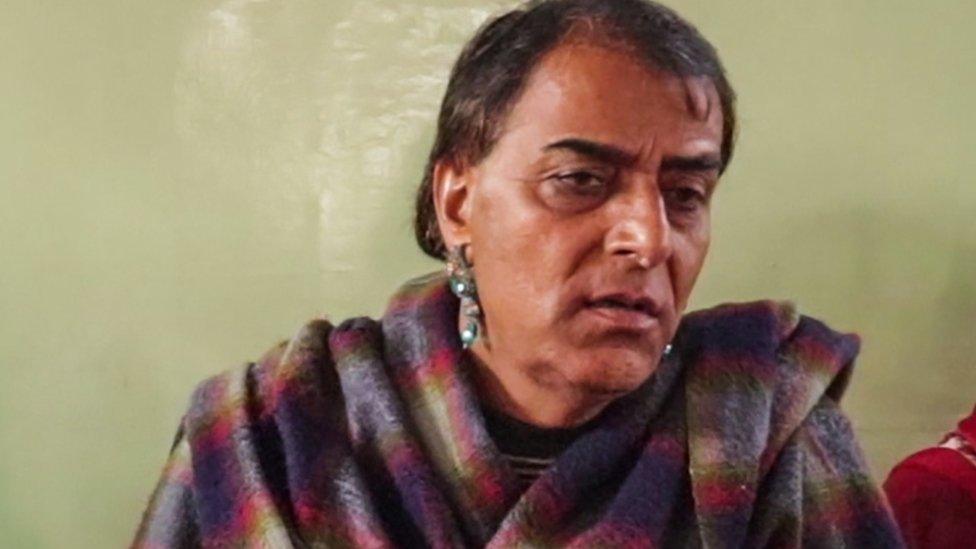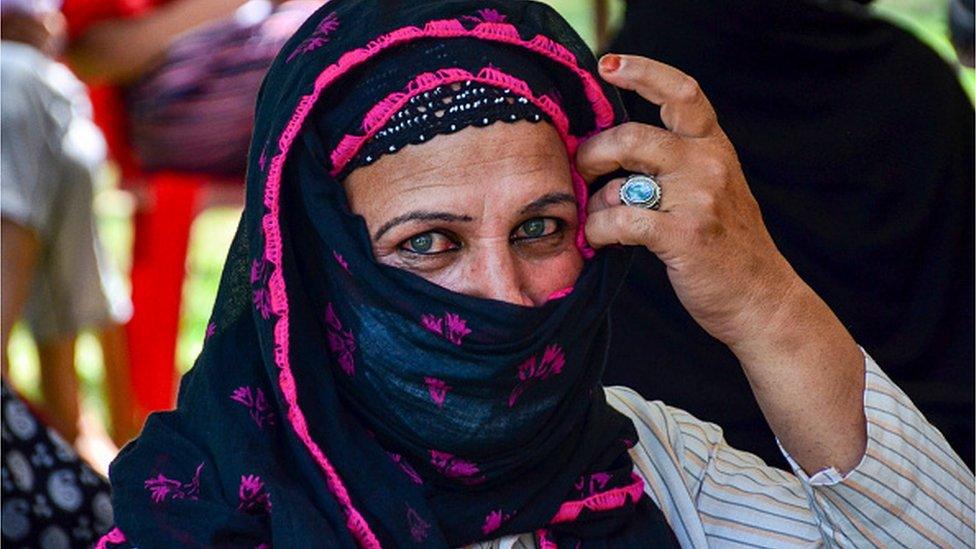Reshma: The Kashmir trans icon who fought pain to bring joy to people
- Published

Loved for her rich voice and quirky style, Reshma was the life of weddings
Last week, Reshma, an iconic trans woman and a singer in Indian-administered Kashmir, died after a long battle with cancer. She was 70.
Her death plunged the region into mourning - and thousands attended her funeral in the main city of Srinagar where the venerated artist lived.
A wedding singer by profession, Reshma injected joy, humour and vitality into the lives thousands of Kashmiris who live under the shadow of violence and conflict.
India and Pakistan both claim Kashmir in full, but control only parts of it. An armed revolt has been waged in the India-administered region for over three decades, claiming thousands of lives.
"In Kashmir, happiness is rare. Almost everyone is under stress in one way or another," says Sapna, a transgender woman in Srinagar. "But Reshma could cheer up anyone with her performance."
Her life was also an inspiration for the region's marginalised eunuch (or hijra) community.
Hijras - who include transgender and intersex people - enjoy a unique position in Kashmiri society presiding over marriages, earning them the moniker "Manzimyoer" or matchmakers.
But they also face discrimination, with many of them abandoned by families and subjected to physical and emotional violence.
The decades-old conflict has overshadowed their plight and recent advances in trans rights have done little to improve their conditions, says LGBTQ activist and writer Aijaz Bund.
"Many of them become matchmakers or singers because society considers them born for it."
For Reshma, however, music was always her calling.
Becoming Reshma
Born in central Srinagar in 1950s, Reshma's childhood was a tightrope walk between constriction and compromise.
At school, she was constantly bullied for speaking and dressing in a feminine manner.
Things were hardly better at home where her family - including two sisters and six brothers - would try to "discipline" her into giving up her ways.
These experiences shaped her worldview and she continued to speak about them later in her career.
"They [parents] thrashed me many times... If only they knew of my inner conflicts," she told journalist Hirra Azmat in 2019. , external
Unable to withstand bullying, she dropped out of school after fifth standard and took up tailoring instead.
It was a lonely period in Reshma's life when, she said, she often found herself feeling "choked" in isolation.
"I would see children my age playing hopscotch and laughing. How could I join them? I knew they would find me strange and poke fun at me."

From childhood to death, Reshma faced discrimination - but she was also loved by many
But music proved her saviour and a moment of unbridled ambition presented itself when Reshma, then 22, went to deliver some clothes to a family and they asked her to sing a song.
Reshma stood, cleared her throat, and began to hum, the song slowly building in her throat. And as she sang in front of the rapt audience, a young man impressed by her talent threw a chit at her with the word 'Reshma' or silk-like written on it.
"That's how I got my public name," she said.
Elated, Reshma ran home to tell her mother what had happened.
But her mother, thinking that the family had ridiculed her child, burst out crying and forbade Reshma from singing again.
So, Reshma continued to hold back, both her songs and her dreams.
A star is born
In 2001, when her younger brother died in a road accident, she decided to take care of his four children.
Her decision was met with resistance from society: "How can a transgender [person] raise a family? This question was continuously posed at me," she said in the 2019 interview.
There were other more pressing challenges too - like the realisation that a tailor's income wasn't enough to raise four children.
That's when Reshma decided to start singing at weddings.
She soon became a familiar figure at celebrations, with her brightly coloured scarves, dancers' anklets tied around her wrists and a smile that lit up her kohl-lined eyes.
Her catchy tunes and winsome poetry - which she imbued with folklore and bawdy commentary - on the fickleness of relationships were much in demand.
Most popular of these was 'Hai Hai Wesyee', a song which elevated Reshma to celebrity status in Kashmir.
A video of the performance shows her singing with quavering verve about a lover's contrasting moods, sometimes as one who would torment them with longing and sometimes fill their heart with joy.
In each stanza, she introduces the lover's idiosyncrasies to their female confidante in the form of a complain, with the words "Hai Hai" acting as a whimsy lament.
The clip went viral in 2018 and has since been viewed tens of thousands of times on social media.
Allow X content?
This article contains content provided by X. We ask for your permission before anything is loaded, as they may be using cookies and other technologies. You may want to read X’s cookie policy, external and privacy policy, external before accepting. To view this content choose ‘accept and continue’.

Reshma's androgynous voice and quirky style were especially popular with women - for many of whom weddings are the only source of entertainment and a time when people forget their tense realities for a moment and revel in celebrations.
A woman who wanted to stay anonymous fondly remembers when Reshma sang at her daughter's wedding in 2018.
She had a way with words where she would often mimic English phrases in a comical way to add more drama to her performances, she said.
"The way it made everyone laugh! She was the queen of social gatherings."
Enduring icon
Over the years, Reshma became a symbol of hope for Kashmir's transgender population who continue to face violence at home and bullying at school.
"Even though our performances cheer up people, we are not recognised as Allah's creation," Sapna says.
But Reshma, with her songs and videos, brought recognition to the talent of trans people, she says, adding that the community "has lost their voice" with her death.
"She never stopped talking about the marginalisation we face from our birth."

Transgender people in Kashmir say they are harassed and humiliated
In her own life though, Reshma continued to face discrimination and stigma, says Mr Bund.
In older interviews, she spoke about how she was spat on, manhandled by strangers and even forced by security personnel stationed in Kashmir to sing and dance, which made her feel humiliated.
"I always wanted to look like a woman. But I would have been killed if I had done that openly," she said last year., external
She was also misgendered throughout her career, being referred to publicly as a man.
"Even after her death, she is seen by people as an artist but is not recognised as a transgender person," says Mr Bund.
But an unfettered Reshma continued to sing and laugh as long as she could.
For her, singing was a life-affirming act - it was what Sapna calls, a "god-gifted talent".
"Her songs and her style had the ability to make people laugh," she says, before quickly adding, "even if they did not understand her completely".
Photos of Reshma courtesy of Ahmad Nisar

Read more India stories from the BBC:
